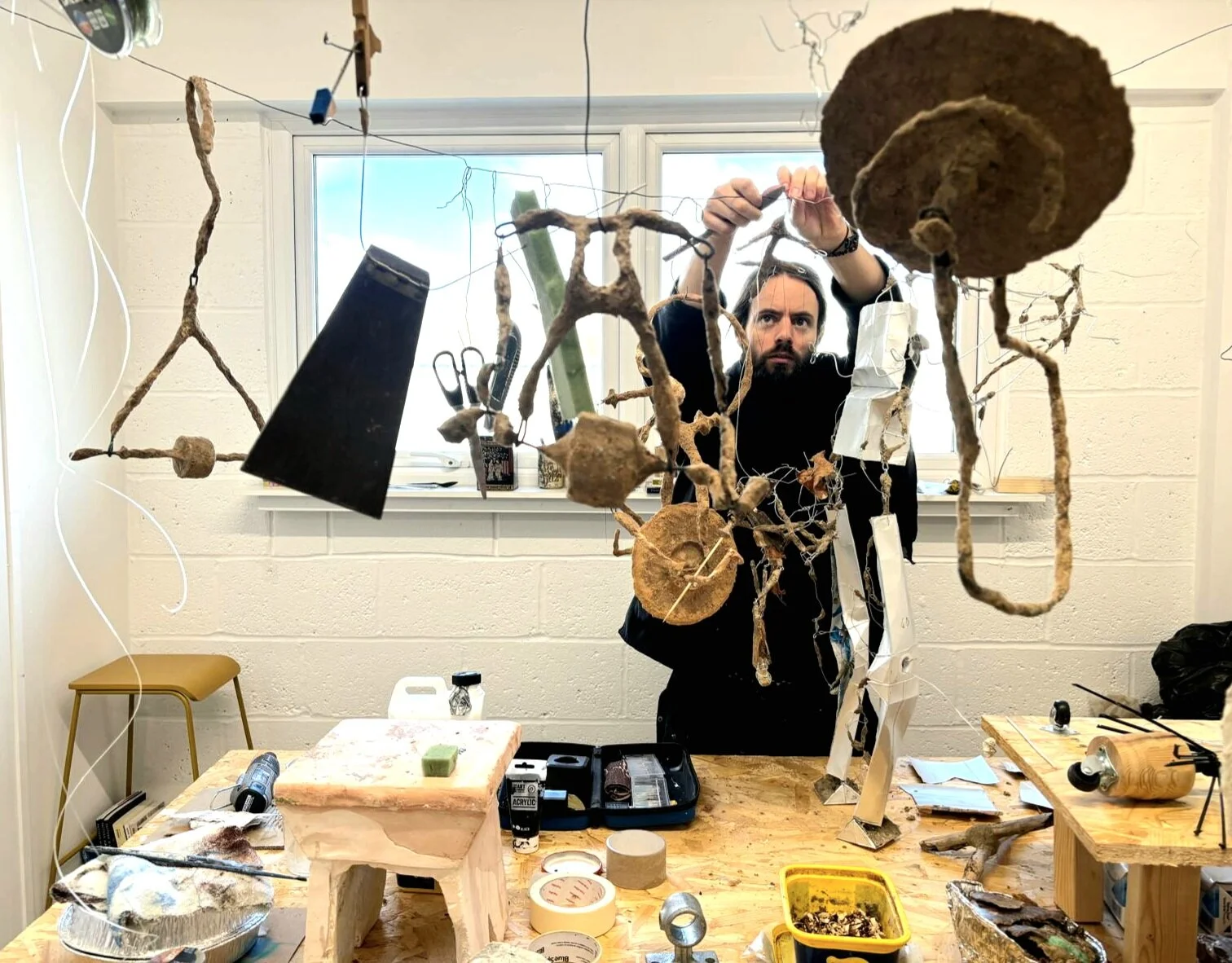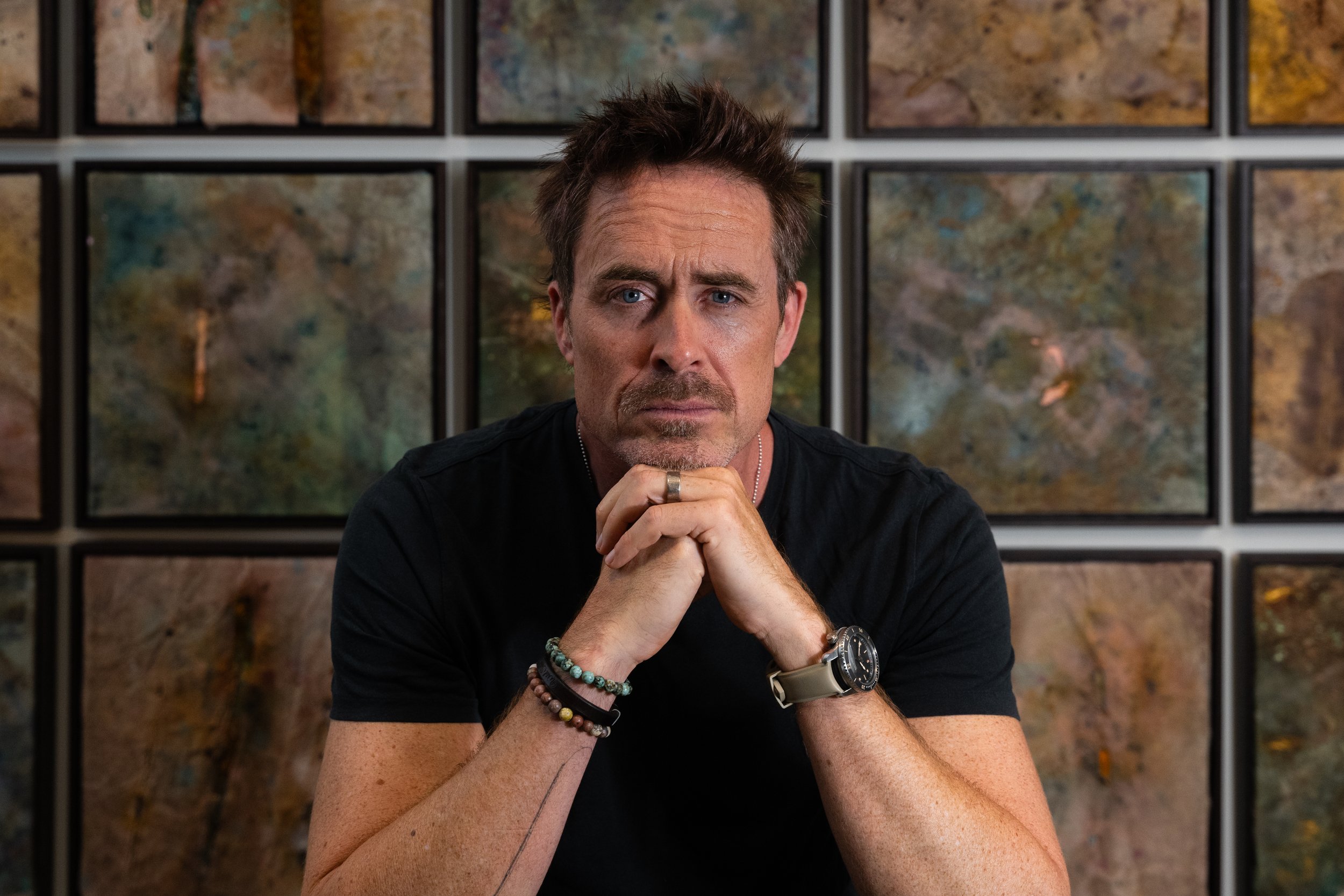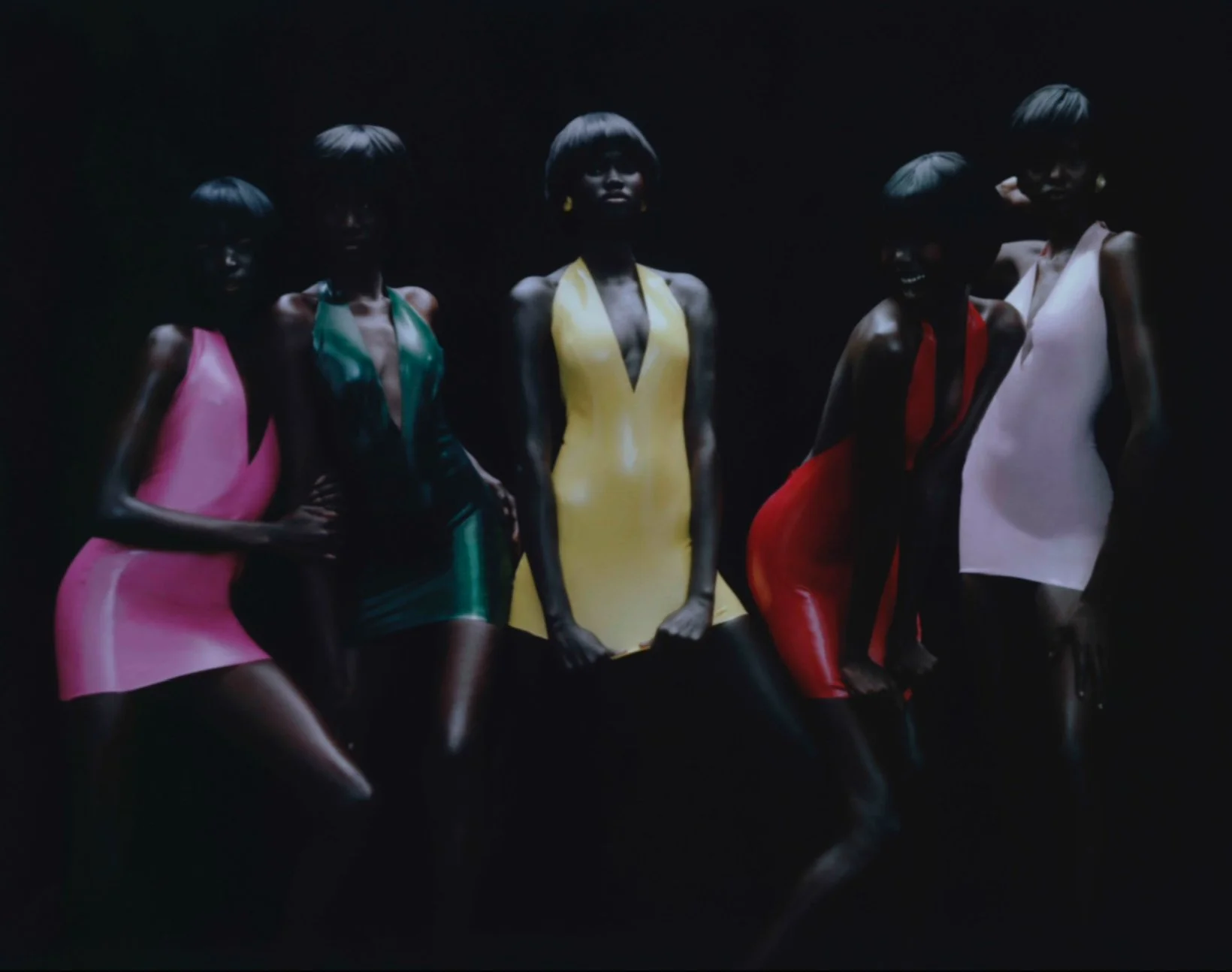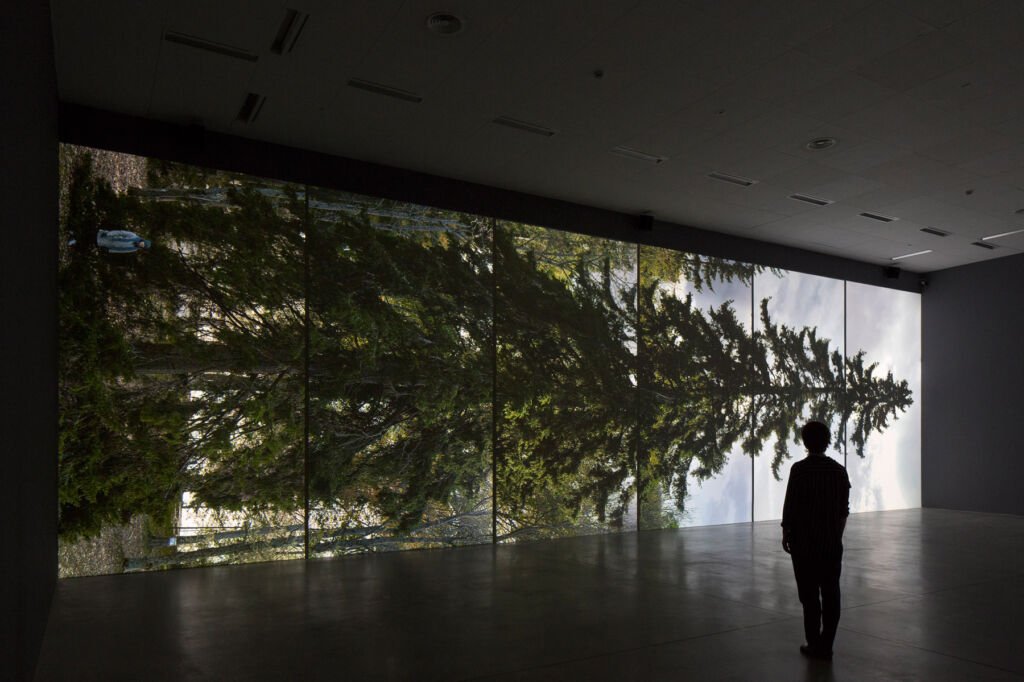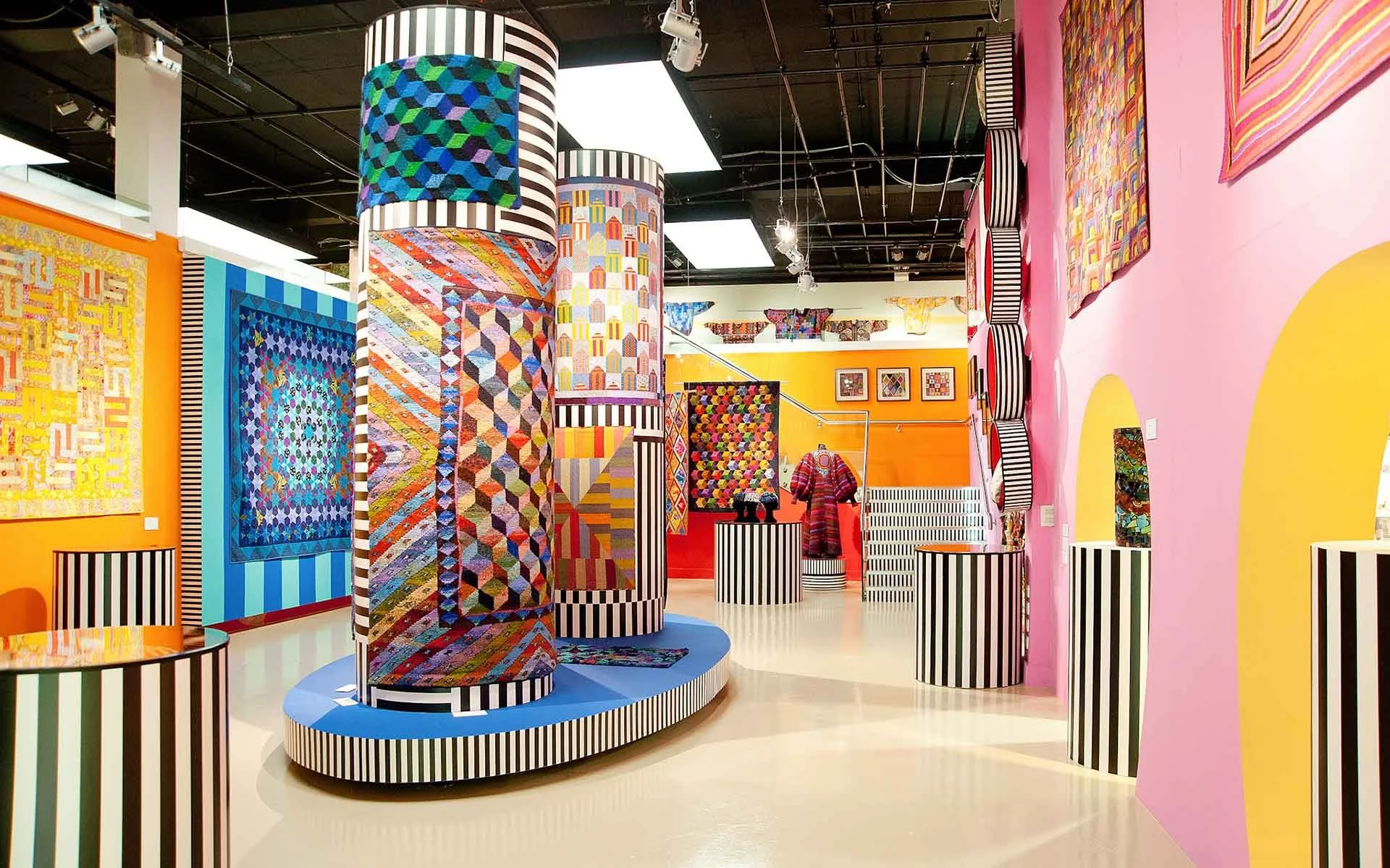In conversation with Matthew Hilton
“The work is a genuine reflection of myself and I hope that observers will recognise that reality and passion.”
- Matthew Hilton

Image. Matthew Hilton. Photo by Romany Gilmour.
Matthew Hilton has spent the majority of his career designing furniture and interior products. He's earned recognition as a Royal Designer for Industry and received multiple awards. His latest exhibit, TOUGH MOMENT, at Paul Smith's gallery, represents his first foray into sculpture.
How did your journey into scultpure begin?
There was not one moment, I have always been a creative person, at school I hid out in the art room and I always loved making things. My journey as a designer happened naturally after going to Kingston to study 3D design, but in the last six years or so, I have felt the urge to work more freely. Just me drawing, modelling and sketching without an end goal; which is how I had spent the majority of my working life. I found myself collecting objects which appealed to me: discarded pieces of metal from factory floor, old tools from flea-markets, bits of flotsam from river banks and beaches. I also began sketching on the iPad, 2D digital black and white artworks. All of this led me to thinking in 3D, experimenting with forms partly influenced by the materials and textures that I respond to but also intuitively playing with shapes. The confidence to know when the proportions of that shape felt right, for sure comes from decades of making those judgements as a designer, but equally, the lack of constraints has been unnerving. This last six or seven years has been a series of tough decisions, tough moments overlaid on a satisfying creative journey.
How would you describe your work's style? Is there a recognisable characteristic that defines it?
People do sometimes say to me that’s very ‘Matthew Hilton’ I sometimes know what they mean, but it is very difficult to identify exactly what characteristics define what constitutes 'Matthew Hilton' character in a design or artwork. What has been interesting is to see and feel that this signature does seem to cross mediums to some extent. I can see there are hints of it in the sculpture collection I am presenting which people who know my design work well may be able to sense.
Style is not a word I like to associate with work I do. To me it means I am working in a way that evokes certain associations.. and generalises in a way that can be misleading. I don’t mind other people making those observations however, that is bound to happen and as a creative person I don’t work in a vacuum without the influences of the time that I am working in and that are part of my history.

Image: Sculptures by Matthew Hilton.
How have you seen your creative approach change and grown over the years?
There isn’t a recognisable pattern or growth. I think that is because the approach to what I am designing, making or creating is influenced by the circumstances of my life, financial concerns and responsibilities as well as who I am working with. My approach could be affected by the attention that my work is receiving or not receiving at the time. As a designer working to produce designs for manufacture, it would affect my opportunities for freedom of expression. At this point in my life, you could say that some of these factors influencing my work have become lighter and I am therefore more free to take risks, push myself to explore and work in a much more solitary way..listening only to my own instincts and making my own decisions. This is new, much of my previous work has a shared responsibility, the manufacturer, the maker, my design team all share in the realising the final result. My name may be on the work in those instances but it feels different to what I am now about to do.
Looking back on your journey as a creative person, can you pinpoint the most fulfilling moment you've experienced?
I have to say that although I have spent most of my life creating objects that have a function, and there have been moments on that journey that stand out as being incredibly rewarding, I think one piece which comes to mind is the Cross table for Case furniture, that has all the elements I try to bring to a piece of furniture, it works, it functions in an interesting way, it has strong visual identity which gives it presence in the market, it takes risks but they pay off, the price is good, the quality is good. Everything is considered down to the packaging for shipping. But..I have found a new level of fulfilment realising objects that derive solely from my trust in an aesthetic and representation of an idea. It’s surprising to me and extremely fulfilling.
Your upcoming exhibition TOUGH MOMENTS is set to be showcased at the Paul Smith Gallery Space. Can you tell us about the journey that brought TOUGH MOMENTS to life?
After having spent time experimenting with 2D drawings and also some model making, I started to feel more confident about asking for feedback from some people I knew in the art world. These conversations encouraged me to keep working and at some point, I felt there was enough of a clear direction in what I was doing to create a collection for a show. On considering who this work might appeal to, it occurred to me that Paul Smith had always been interested in my work and in the ’80’s was one of the first people to buy my cast aluminium candle sticks to sell in his shop.
I contacted him and there was a very positive response. From that point on I started working in earnest to translate the pieces I was working on from 3D CAD objects and printed models to the full size objects themselves.

Image: Installation view of Matthew Hilton: TOUGH MOMENT at the Paul Smith Gallery Space, Albemarle Street, Mayfair.
What was the driving inspiration behind the works that will be on show?
There are many inspirations, or aims or ideas I had in mind, there is the raw beauty of industry, the heat, the noise, the smells, there is huge respect for people who manufacture things at this heavy engineering level. I have seen hundreds of factories and I came to realise that there is a very elegant and functional, distilled aesthetic that comes for things being designed purely for function, for cost effectiveness, longevity, robustness. A truck gear box casing for example has little time spent on aesthetics in its design but the criteria, the framework set by the aim of the designers, in the end produces a thing of elegant raw beauty in my mind. These things are rarely seen, almost never judged for their aesthetic quality and I wanted to draw attention to this almost by product aesthetic. I see beauty there which I am trying to elevate, or highlight.
What kind of experience do you envision for visitors engaging with your pieces?
Art is obviously a subjective and personal experience, and people will engage with it in their own unique ways. Some may respond, others not at all. For those that do, I suppose they may feel the same things that I do- an appreciation of the materiality, solidity and weight of the pieces. They might feel the tension between the weight of the material and the lightness of the interacting forms. Some of the pieces have references to intimate relationships, to the duality and singularity, the pushing away and coming together, splits, joins and what is between. The glue and the space, the attraction and rejection.
I hope people will recognise those elements but also I know that people will see different things and in the end I can do only what I can do. This being my first ever show I am supremely interested in how people will respond. The work is a genuine reflection of myself and I hope that observers will recognise that reality and passion.
Throughout your career, what’s been the most impactful lesson you’ve learned about yourself, your skills, or just life in general?
I am surprised, I surprise myself, I hadn’t realised I could work so hard, I have realised that relationships in your career are very important, in life also of course. I have learnt how a positive and flexible attitude is a massive asset.
I now understand that although the doing is supremely important, it is the thinking that makes the biggest difference. without that being thorough the end result is rather vacuous.
Is there a piece of advice you’ve received that really resonated with you and significantly influenced your approach to your work?
Ha, believe in yourself and work hard, the same advice I would give anyone.
We like to discover new artists in our interviews. Are there three designers you'd recommend our readers keep an eye out for this year?
I have been really immersed in MY new direction so I really can't be sure I am up to date and following all the design world news but I think what Atelier thirty four are doing is really interesting they have just recently started their own design business after loyally working with me for decades. They are creating some lovely things.We will also continue to work together under the Matthew Hilton Studio name.
As someone who has deeply impacted the world of furniture design, what advice would you offer to emerging designers?
It may be a cliche but believe in yourself and work hard. There is absolutely no escaping working hard, just put hours in. Work out what your beliefs are, what you are interested in and be genuine.You need to feed your mind and let your work be informed by the world around you rather than other designs/designers.
Matthew Hilton: TOUGH MOMENT will be on at the Paul Smith Gallery Space on Albemarle Street, Mayfair, until 31 October 2023.
Website: matthewhiltonstudio.com
Instagram: @matthewhiltonsculpture
Gabriele Beveridge is known for her sculptural and conceptual practice that combines materials as diverse as hand-blown glass, photo chemicals, and found images…
Robyn Orlin is a South African dancer and choreographer born in Johannesburg. Nicknamed in South Africa "a permanent irritation", she is well known for reflecting the difficult and complex realities in her country. Robyn integrates different media into her work (text, video, plastic arts) to she investigates a certain theatrical reality which has enabled her to find her unique choreographic vocabulary…
Katrina Palmer, an artist known for exploring materiality, absence, and dislocation, recently spoke to us following her year-long residency at the National Gallery about her exhibition The Touch Report…
Enej Gala is an artist who splits his time primarily between London and his hometown of Nova Gorica, Slovenia. A graduate of the Academy of Fine Arts in Venice and the Royal Academy Schools (2023), Gala first gained our attention with Neighbour’s Harvest, an installation that cleverly combined puppetry and conceptual art…
David Ottone is a Founding Member of Award-winning Spanish theatre company Yllana and has been the Artistic Director of the company since 1991. David has created and directed many theatrical productions which have been seen by more than two million spectators across 44 countries…
Darren Appiagyei is a London-based woodturner whose practice embraces the intrinsic beauty of wood, including its knots, cracks, bark, and grain. Highly inspired by Ghanaian wood carving, Darren explores raw textures and new woods in his work…
Huimin Zhang is an artist specialising in 22K gold, known for her innovative craftsmanship. She combines various cultural techniques, including filigree, engraving, and European gold and silver thread embroidery, to create unique works…
Akinola Davies Jr. is a BAFTA-nominated British-Nigerian filmmaker, artist, and storyteller whose work explores identity, community, and cultural heritage. Straddling both West Africa and the UK, his films examine the impact of colonial history while championing indigenous narratives. As part of the global diaspora, he seeks to highlight the often overlooked stories of Black life across these two worlds.
Hannah Drakeford is a London-based interior designer known for her bold and colourful interiors. She transitioned from a 21-year retail design career to interior design, and has gained popularity on social media where she now shares creative upcycling tutorials and encourages individuality in home decor…
Shula Carter is an East London-based creative with a background in contemporary, ballet, and modern dance. She trained at the Vestry School of Dance and later at LMA London, where she developed skills in commercial, hip hop, and tap dance, alongside stage and screen performance…
Dian Joy is a British-Nigerian interdisciplinary artist whose work delves into the intersections of identity, digital culture, and the fluid boundaries between truth and fiction. Her practice is rooted in examining how narratives evolve and shape perceptions, particularly in the digital age.
Dian Joy is a British-Nigerian interdisciplinary artist whose work delves into the intersections of identity, digital culture, and the fluid boundaries between truth and fiction. Her practice is rooted in examining how narratives evolve and shape perceptions, particularly in the digital age.
John-Paul Pryor is a prominent figure in London’s creative scene, known for his work as an arts writer, creative director, editor, and songwriter for the acclaimed art-rock band The Sirens of Titan…
Jim Murray is an actor, director, conservationist and artist known for Masters of Air (2024) and The Crown (2016). Murray first came to prominence as an artist in 2023 with his acclaimed inaugural exhibition In Flow, where his dynamic abstract paintings were hung in conversation with John Constable’s The Dark Sid…
Anthony Daley is an abstract expressionist painter known for his vibrant, large-scale works that explore beauty through intense colour and light. His art bridges the past and present, drawing inspiration from the Old Masters as well as diverse sources like literature, science, poetry, and nature.
Rachel Kneebone’s work explores the relationship between the body and states of being such as movement, stasis, and renewal. Through her porcelain sculptures, she examines transformation and metamorphosis, reflecting on what it means to inhabit the body and be alive…
Saff Williams is the Curatorial Director at Brookfield Properties, bringing over fifteen years of experience in the arts sector…
Sam Borkson and Arturo Sandoval III, the acclaimed LA-based artists behind the renowned collective "FriendsWithYou," are the creative minds behind "Little Cloud World," now on display in Covent Garden. During their recent visit to London, we had the privilege of speaking with them about their creative process and the inspiration behind this captivating project.
Kinnari Saraiya is a London-based Indian artist, curator, and researcher whose work focuses on trans-altern and post-humanist ideas from the Global South. She is currently a curator at Somerset House and has held positions at the Baltic Centre for Contemporary Art, Frieze Art Fair, and Bowes Museum....
Fusing her Asian roots with a fascination for African pattern work and her deep passion for architectural geometry, Halima’s work is intense yet playful, structured yet creative; substantial yet dynamic and invariably compelling in its originality.
Matilda Liu is an independent curator and collector based in London, with a collection focusing on Chinese contemporary art in conversation with international emerging artists. Having curated exhibitions for various contemporary art galleries and organisations, she is now launching her own curatorial initiative, Meeting Point Projects.
EKLEIDO, a choreographic duo formed by Hannah Ekholm and Faye Stoeser, choreograph performances for live shows and film.
Lydia Smith is one to watch. Currently on show in three different places across London, her work can be seen in a solo exhibition in the City, a group show in a chapel in Chelsea and through a new series of monumental sculptures installed outdoors across sprawling parkland…
Taipei-based IT entrepreneur Elsa Wang is the founder of Bluerider ART, a progressive gallery at the intersection of art and technology.
Jemma Powell is known for her observational landscapes. She is also an accomplished actress having featured in Tim Burton’s Alice in Wonderland…
Suzanna Petot, originally from New York, is a curator and writer based in London. She holds an MA in Curating the Art Museum from The Courtauld Institute of Art and has worked at various institutions in the U.S., Italy, and the UK, including Gallerie delle Prigioni, The Courtauld Gallery, Tate Modern, M.I.T List Center for Visual Art, and the Metropolitan Museum of Art…

180 Studios will present the largest showcase of photographer and filmmaker Gabriel Moses’ work to date, featuring over 70 photographs and 10 films in March…
Cartier Exhibition at the V&A · Giuseppe Penone: Thoughts in the Roots · Antony Gormley: WITNESS · Richard Wright at Camden Art Centre · The Carracci Cartoons: Myths in the Making · Eileen Perrier: A Thousand Small Stories · Ed Atkins at Tate Britain · Richard Hunt: Linear Peregrination · Nolan Oswald Dennis at Gasworks · Nora Turato: pool7 · In House: Ree Bradley and Pete Gomes at Studio Voltaire…
The Shirley Sherwood Gallery of Botanical Art at Kew Gardens will showcase new botanical works, cinematic installations, and the connections between artists and trees…
Chiharu Shiota: The Soul Trembles · The Flowers of Yves Saint Laurent · Collective Joy – Learning Flamboyance! · The People of the North · Corps et âmes · Louvre Couture: Art and Fashion—Statement Pieces · David Hockney 25 · Paris Noir · Olga de Amaral · Azzedine Alaïa / Thierry Mugler: 1980-1990 – Two Decades of Artistic Affinities
Claudia Pagès Rabal: Five Defence Towers · Tirzah Garwood: Beyond Ravilious · Heather Agyepong: Through Motion · Christina Kimeze · Citra Sasmita: Into Eternal Land · Mire Lee: Open Wound · Linder: Danger Came Smiling · Galli: So, So, So · Mickalene Thomas: All About Love …
Splash! A Century of Swimming and Style · Astonishing Things: The Drawings of Victor Hugo · Arpita Singh: Remembering · 2025 Deutsche Börse Photography Foundation Prize · The Craft of Carpentry: Drawing Life from Japan’s Forests · Grayson Perry: Delusions of Grandeur · Edvard Munch: Portraits · Ficre Ghebreyesus · Textiles: The Art of Mankind · Eunjo Lee…
Highsnobiety: Not In London · LFW Pop-Up Shop · 1664 Blanc Activation · Alo Wellness Activations · Dylon Detergent Pop-Up: Rethink New Laundrette · Morocco - Kingdom of Light at LFW · Pandora x Priya Ahluwalia Collection · Rixo Exclusive Event · Grow Hackney · Meanwhile…In Shoreditch · DREST · LFW Solana X HAPE Social X Never Fade Factory · London College of Fashion, UAL · Margaret Howell · Nosakhari: Able-Graphy Exhibition · Nosakhari · NET-A-PORTER…
We are offering you the chance to win five pairs of tickets to the 21st edition of Collect Art Fair, the leading international art fair for contemporary craft and design.
Since its launch in Morocco, 1-54 has not only contributed to the growing prominence of African contemporary art but has also played a pivotal role in cementing Marrakech as a major cultural destination. This year, the fair took place across two prestigious venues: the luxurious La Mamounia Hotel and DaDa, a multidisciplinary art space in the heart of the Medina…
Body & Soul - Joan Snyder • Hew Locke: What Have We Here? • Michelangelo, Leonardo, Raphael: Florence, c. 1504 • Turner Prize 2024 • Taylor Wessing Photo Portrait Prize 2024 • Letizia Battaglia: Life, Love and Death in Sicily • Silk Roads • Matthias Groebel: Skull Fuck • Later Works - Jack Jubb • Greg Carideo: groundwork & 00:00:01
Leigh Bowery · Noah Davis · Linder: Danger Came Smiling · Collect Art Fair 2025 · Donald Rodney: Visceral Canker · Goya to Impressionism: Masterpieces from the Oskar Reinhart Collection · Theaster Gates: 1965: Malcolm in Winter: A Translation Exercise · The Face Magazine: Culture Shift · Salt Cosmologies: Himali Singh Soin & David Soin Tappeser · So, So, So: Galli’s Solo Exhibition Rescheduled to 2025 · Claudia Pagès Rabal · Ai Weiwei: A New Chapter…
Mitsuko Uchida & Mahler Chamber Orchestra: Mozart · KOKO’s “Electric Nights” · FOR FUCK SAKE · Seth Troxler at Fabric · Errol Linton at Green Note · Soweto Kinch: Soundtrack to the Apocalypse · Lily Lyons · Wu-Lu, Denzel Himself & SHEIVA · Tyshawn Sorey Trio · Dreamscapes · Sachiko M – Two-Day Residency · Sarah Nimmo · Raindance at Fabric 2025 · East End Dubs: Extended London…
White Cube · Fashion and Textile Museum · VITRINE Bermondsey · Kristin Hjellegjerde Gallery · Science Gallery London…
PAD Art Fair · LAPADA Berkley Square · Frieze Art Fair · 1-54 London · London Art Fair · Collect Art Fair · Photo London · Women in Art Fair · The Other Art Fair · StART Art Fair · Ceramic Art London Fair…
January usually sees a flurry of winter light festivals in London, featuring creative displays by local and international artists. From Battersea Power Station to Canary Wharf, here is our guide to key ones to look out for in London this month…
London Symphony Orchestra/Sir Simon Rattle Tippett, Turnage & Vaughan Williams · Wayne Marshall · Schumann’s Piano Concerto · Half Six Fix at the Barbican · India’s Music of Today: Niladri Kumar Darbar · Strings from the Royal Opera House Orchestra and Victor Sangiorgio London Chamber Music Society Sundays…
Van Gogh: Poets and Lovers at the National Gallery · Haegue Yang: Leap Year at Hayward Gallery · The Imaginary Institution of India: Art 1975–1998 at Barbican Art Gallery · Lygia Clark: The I and the You at Whitechapel Gallery · Sonia Boyce: An Awkward Relation at Whitechapel Gallery · Francis Bacon: Human Presence…
Jake Grewal: Under The Same Sky · New Contemporaries · Brasil! Brasil! The Birth of Modernism · Christina Kimeze · Citra Sasmita: Into Eternal Land · At Home: Alice Neel in the Queer World · Tarot: Origins & Afterlives · Jonathan Baldock: 0.1% · Gregg Bordowitz: There: a Feeling · Peter Hujar – Eyes Open in the Dark · Tanat Teeradakorn: National Opera Complex · Fairy Story: Last Night, I Dreamt of Manderley · Matthias Groebel: Skull Fuck…
Donald Rodney: Visceral Canker · 15 Years of Duchamp & Sons · Hamad Butt: Apprehensions · The London Open Live · Joy Gregory: Catching Flies with Honey · Candice Lin…
As ski season kicks off, resorts like St. Moritz, Gstaad, Courchevel, Aspen, Whistler, and Verbier are becoming vibrant cultural destinations. Beyond world-class slopes, these hotspots offer a range of art exhibitions and outdoor sculptures. This guide highlights the must-see art exhibitions this winter across Europe, the US, and Japan…
Victoria Miro · Motion in Stillness: Dance and the Human Body in Movement · Feast · County Hall Pottery · Nicole Eisenman · Sadie Coles HQ · Parmigianino: The Vision of Saint Jerome · National Gallery · Feliciano Centurión: Hope in Bloom · Cecilia Brunson Projects · Jeff Wall · White Cube Bermondsey · Justin Dingwall · Doyle Wham · Group Exhibition: Reverb · Stephen Friedman Gallery…
The Imaginary Institution of India: Art 1975-1998 · Francis Bacon: Human Presence · Felicity Aylieff: Expressions in Blue · Haegue Yang: Leap Year · Hyundai Commission: Mire Lee · Sammy Baloji · Sonia Boyce: An Awkward Relation · Hew Locke: what have we here? · Nicola L. · Mike Kelley: Ghost and Spirit · Letizia Battaglia · Lauren Halsey: emajendat · The World of Tim Burton · Wildlife Photographer of the Year…
The National Gallery is set to present a vibrant programme of exhibitions in 2025, showcasing its rich artistic heritage while highlighting contemporary themes and narrative…
Sketch London’s iconic destination transforms into a festive wonderland celebrating the magic of holiday confections and cultural traditions.
The Serpentine Galleries are set to deliver a spectacular programme in 2025, featuring groundbreaking exhibitions and events that explore themes of identity, ecology, and technology…
Twelve artists will compete for a £15,000 prize and a solo exhibition, celebrating the creativity and diversity of East London.
London’s dazzling Winter Lights festival returns with 11 new installations and iconic displays, transforming Canary Wharf from 21 January 2025…




